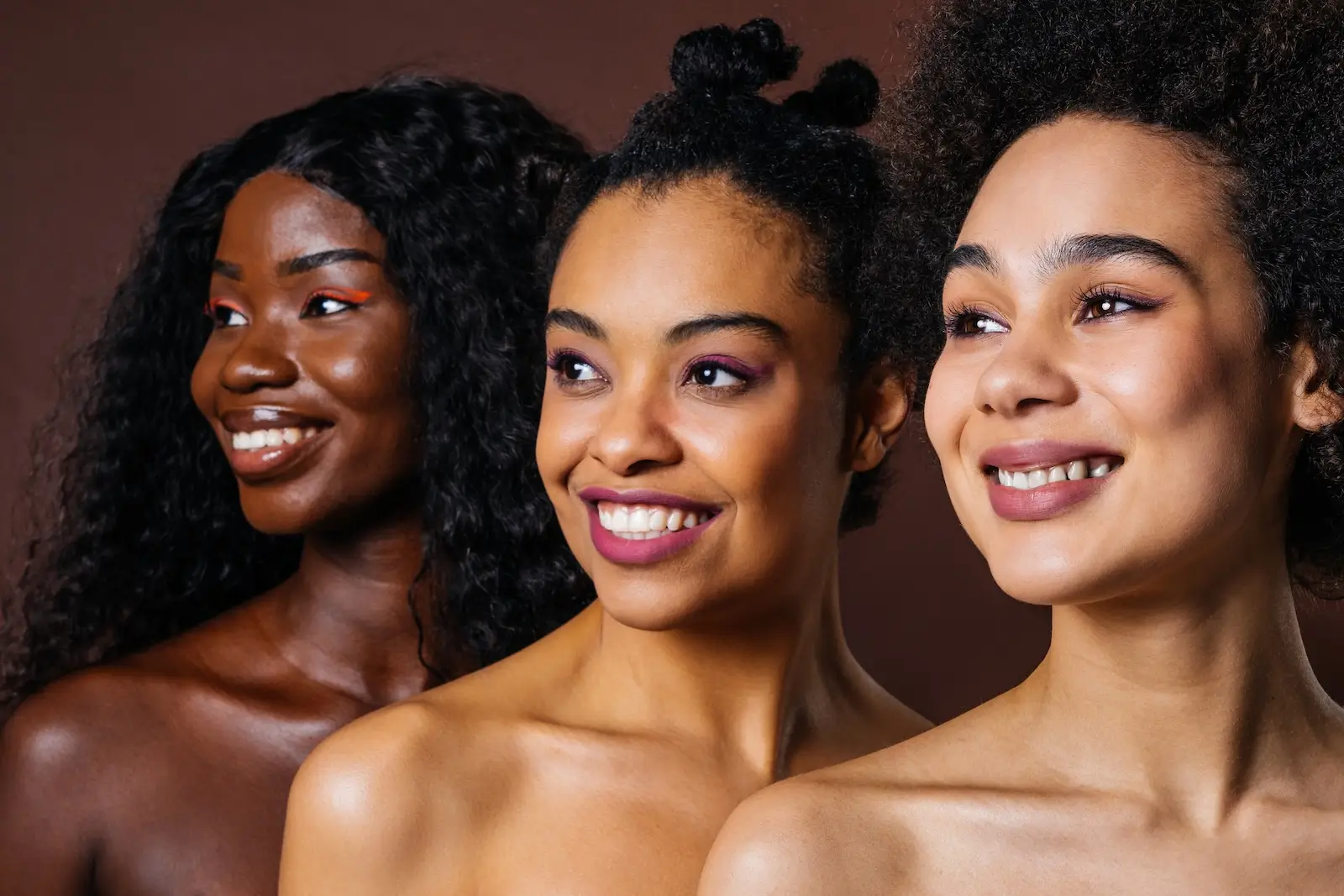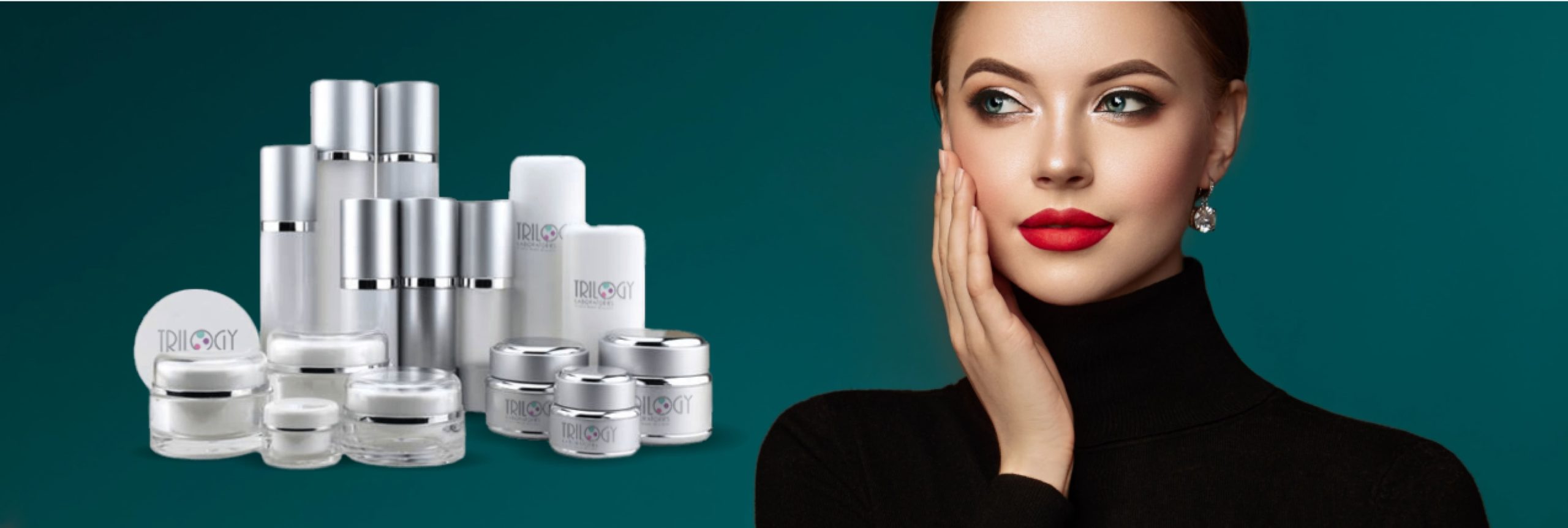Dark skin is beautifully rich in melanin, which gives it a naturally radiant tone and built-in resilience. But this same melanin also means that the skin of African Americans has unique needs that set it apart. While many skin care tips stand regardless of skin color, understanding these needs is important for people with melanin-rich skin crafting a personal skin care routine that works and for anyone formulating products designed to truly serve the skin care needs of African American consumers.
The Fitzpatrick Scale is universally used in dermatology and aesthetics to assess sun sensitivity, risk of hyperpigmentation, and to guide treatment. It ranges from Type I (very fair skin that always burns and never tans) to Type VI (deeply pigmented dark brown or black skin that never burns).
With the right knowledge and the right products, melanin-rich skin (Fitzpatrick III – VI) can thrive, glow, and remain resilient against the challenges it faces.
What Makes Dark Skin Unique?
African American skin is not just skin tone. It’s a unique biological makeup that influences everything from aging to how the skin reacts to certain treatments. Recognizing these differences allows for smarter care, more effective formulations, and healthier outcomes.
Higher Melanin Content
Melanin is the pigment that gives skin its deeper tone. It provides a level of natural sun protection that’s greater than lighter skin tones, slows visible signs of aging, and reduces the risk of sunburn. However, it also makes the skin more susceptible to post-inflammatory hyperpigmentation (PIH).
Even minor irritations like a scratch, breakout, or bug bite can trigger dark spots that linger. The higher melanin concentration makes any inflammation more visible and longer-lasting, so prevention and gentle treatment are a priority.
Increased Risk of Keloids
Individuals with Fitzpatrick Skin Types III to VI are at a higher risk for keloid formation due to increased melanin activity and a more reactive wound healing response. Keloids—raised, often itchy scars—occur more frequently in African American individuals due to the skin’s heightened wound-healing response. Even a small pimple or cut can develop into a thickened scar if the skin is sensitive to trauma. This heightened reactivity means extra care must be taken with procedures like waxing, piercings, and laser treatments as well as chemical peels.
Preventing skin injuries and treating them early helps reduce the risk of permanent scarring.
Oilier Skin Type
Many African Americans naturally produce more sebum, the skin’s oil. This heightened production can be a blessing, as it helps maintain skin moisture and slows signs of aging, but excess oil also means a higher chance of clogged pores, breakouts, and shine, especially in the T-zone.
Managing oil production without stripping the skin is key. Using non-comedogenic products and gentle exfoliants can keep skin balanced and breakout-free.
Thicker Dermis
The deeper layer of the skin, called the dermis, is typically thicker in Black individuals. This thicker dermis contributes to firmer, more resilient skin that ages more slowly.
At the same time, it can also be prone to conditions like seborrheic dermatitis, which causes flaking, redness, and irritation. It may also make some topical treatments slower to absorb. Therefore, African American skin tends to require well-formulated products that penetrate deeply.
Common Myths About Black & Brown Skin
Misinformation about African American skin care has led to persistent myths that often hinder proper treatment and maintenance. Debunking these misconceptions is critical for creating better routines and more effective product formulations. By challenging these myths and avoiding harmful ingredients, individuals and brands alike can better support the beauty and resilience of melanin-rich skin.
Let’s go over some of the most common myths and the truth behind them.
Myth: Black People Don’t Need Sunscreen
Although melanin provides some natural sun protection, it doesn’t shield the skin completely from UV damage. Fitzpatrick III – VI skin is still vulnerable to sunburn, photoaging, and sun-induced hyperpigmentation.
People of all skin colors and types should wear broad-spectrum SPF 30+ daily to protect the skin, reduce the signs of aging, and prevent dark spots from worsening.
Myth: Ashiness Just Means Dryness
Ashy skin is a sign of surface dryness, but it can also indicate poor exfoliation or compromised skin barrier function.
Addressing this skin concern requires a combination of hydration and regular, gentle exfoliation. It’s important to keep in mind that using a rich moisturizer alone might not resolve the problem if dead skin cells aren’t removed properly.
Myth: Melanin-Rich Skin Doesn’t Age
While African American skin may show signs of aging later due to its thicker dermis and higher collagen content, it is not immune to aging. Wrinkles, sagging, and hyperpigmentation still occur, often compounded by environmental stress.
Consistent skin care, sun protection, and antioxidant use are essential.
Myth: All Skin Care Products Work the Same on All Skin Tones
Ingredients and formulations can behave differently on melanin-rich skin. Some products may cause discoloration, scarring, or irritation more readily in darker tones. Tailored skin care that considers these differences ensures safer, more effective results.
African American Skin Concerns & Conditions

Melanin-rich skin is strong and vibrant, but it comes with challenges that need specific care. These common concerns can be managed effectively with the right education and skin care routine.
Hyperpigmentation
One of the most common concerns for African American skin is hyperpigmentation. Any inflammation—acne, insect bites, cuts—can lead to dark marks that take months or even years to fade.
The key is to reduce inflammation quickly and prevent further trauma to the skin. Gentle exfoliation, sun protection, and brightening agents like vitamin C, kojic acid, turmeric or niacinamide are essential. Consistency in your routine is what brings results.
Acne & Acne Scars
Oily skin combined with environmental stressors can lead to stubborn acne. In African American skin, breakouts often leave behind dark spots or textured scars, making treatment more complex. Traditional acne treatments may be too harsh and cause further pigmentation issues.
Instead, look for non-drying products with ingredients like salicylic acid, tea tree oil, or gentle retinoids. And always follow up with a calming moisturizer to support healing.
Dryness & Ashiness
Even though the skin may be oily, Black skin can often appear dull or ashy. This paradox is due to transepidermal water loss (TWEL)—when moisture evaporates from the skin, even if oil is present.
Regular hydration with ingredients like hyaluronic acid and rich emollients can help seal in moisture. Gentle exfoliation will also help eliminate dead skin cells that contribute to the ashy appearance, leaving behind skin that is luminous and smooth.
Eczema & Dermatitis
Black individuals are more likely to experience certain chronic skin conditions like eczema and seborrheic dermatitis. These conditions can cause flaking, redness, and itching, especially around the scalp, nose, and hairline. Many triggers—including harsh ingredients, fragrance, or climate changes—can worsen symptoms.
Using calming products with ingredients like aloe vera, colloidal oatmeal, and ceramides can provide relief and support a healthy skin barrier.
Ingredients to Avoid in African American Skin Care
Choosing the right ingredients is just as important as following the right skin care steps. While some ingredients offer powerful benefits for all skin types, others can be especially harsh or problematic for African American skin. Because melanin-rich skin is more prone to PIH, scarring, and sensitivity, it’s critical to be mindful of what goes into your products.
Here are some ingredients best avoided—or used with caution—when caring for African American skin.
Harsh Physical Exfoliants
Ingredients like walnut shells, apricot kernels, and coarse scrubs can cause micro-tears in the skin. These tiny injuries may not be visible, but they can lead to irritation and PIH.
Instead, opt for gentle chemical exfoliants like mandelic, kojic or lactic acid, which encourage cell turnover without abrasive damage.
High-Alcohol Content
Alcohol-based toners or treatments (especially denatured alcohol or SD alcohol) may seem like a quick fix for oily skin, but they often strip the skin of its protective oils. This process can trigger more oil production and leave skin feeling irritated, tight, or dry—making conditions like acne or eczema worse.
Synthetic Fragrance & Dyes
Artificial fragrances and dyes are leading culprits in triggering allergic reactions, eczema flare-ups, and dermatitis. Since African American skin can be more reactive, it’s best to choose fragrance-free or naturally scented products, with essential oils used sparingly.
Hydroquinone (Overuse or Unsanctioned Use)
While hydroquinone can be effective for treating hyperpigmentation, using it long-term or without supervision may cause ochronosis, a bluish-black discoloration of the skin. It should be used cautiously and preferably under the guidance of a licensed physician. Instead use ingredients like arbutin, tranexamic acid, licorice root extract, kojic acid, azelaic acid and resorcinol.
Parabens & Harsh Preservatives
While not specific to dark skin, some parabens and chemical preservatives can disrupt the skin barrier or hormone balance. Avoiding them can help maintain long-term skin health, especially for people with sensitive or reactive skin.
6 African American Skin Care Tips
To truly care for your skin, your approach should be strategic, gentle, and deeply nourishing. Follow these tips that are designed to address real African American skin care concerns and deliver long-lasting results.
1. Use Gentle Cleansers
Start your routine with a cleanser that respects the skin’s natural barrier. Avoid harsh sulfates or high-foaming agents that strip oils and increase dryness or irritation. A mild, sulfate-free cleanser will effectively remove dirt, oil, and makeup while keeping skin calm and hydrated.
For acne-prone skin, a cleanser with salicylic acid can help manage breakouts without causing inflammation.
2. Exfoliate Regularly (but Gently)
Dead skin cells can build up and contribute to dullness and uneven texture, especially in melanin-rich skin. However, aggressive exfoliation can cause tiny tears in the skin and lead to dark spots.
Use gentle chemical exfoliants like glycolic or lactic acid once or twice a week to promote turnover without irritation. Physical scrubs should be avoided or used very sparingly.
3. Incorporate Hydrating Ingredients
Hydration is non-negotiable. Ingredients like hyaluronic acid draw moisture deep into the skin, while glycerin and ceramides strengthen the skin barrier. These help combat ashiness and maintain elasticity. Even oily skin types need hydration to stay balanced. Dehydrated skin may produce more oil to compensate, leading to breakouts.
4. Treat Hyperpigmentation Wisely
Because hyperpigmentation can worsen with irritation, it’s important to choose gentle brighteners. Niacinamide, vitamin C, and licorice root extract are great options that target dark spots without causing redness or peeling.
Avoid hydroquinone unless recommended by a physician, as it can sometimes cause rebound pigmentation if overused.
5. Don’t Skip Sunscreen
There’s a misconception that darker skin doesn’t need sun protection.
In truth, melanin offers some protection, but not enough to prevent sun-induced hyperpigmentation, reduce signs of aging, and minimize the risk of long-term sun damage. A broad-spectrum sunscreen of at least SPF 30 should be used every day. Look for mineral-based formulas that are tinted or designed not to leave a white cast.
6. Moisturize Daily
Moisturizing helps maintain a strong skin barrier and prevent transepidermal water loss. Use lightweight, non-comedogenic moisturizers during the day and richer creams at night, especially if skin feels tight or dry. In colder months, a balm or ointment can lock in hydration and protect against environmental damage.
Best Skin Care for African American Skin: 7 Products Ideal for Dark Skin

At Trilogy Laboratories, we offer expertly formulated products that meet the unique skin care needs of African American skin. From deep hydration to gentle exfoliation and targeted treatments for hyperpigmentation, our solutions are science-backed and thoughtfully designed.
To help you get started, we’ve created a list of standout products tailored for melanin-rich skin. Each of these products supports the natural beauty and health of African American skin by focusing on hydration, gentle care, and targeted treatment.
Whether you’re building a personal skin care routine or developing a product line, Trilogy Laboratories offers proven solutions you can trust.
1. Revive Cream
This restructuring cream delivers a powerful cocktail of actives that dive deep into the epidermis rejuvenating the appearance of skin. Revive Cream contains Orchid Stem Cells make skin look more firm while Growth Factors increase skin elasticity by up to 47% in 4 weeks.
2. Kojic Acid and Peony Serum
Hyperpigmentation is a top concern for melanin-rich skin, and this potent kojic acid serum helps brighten uneven tone and fade dark spots effectively. It’s also rich in antioxidants that protect against environmental stress. This gentle but powerful formula is perfect for promoting a more even, radiant complexion without irritating sensitive skin.
3. 100% HA Serum
Hydration is essential in preventing transepidermal water loss (TEWL), which leads to ashiness and flakiness. 100% HA Serum is a pure hyaluronic acid serum that deeply hydrates and plumps the skin, locking in moisture without heaviness. It’s especially effective for African American skin, which often needs hydration support without added oil.
4. Blueberry Peel
Formulated to gently resurface the skin, our Blueberry Peel helps combat hyperpigmentation and smooth uneven texture. Its mandelic acid content promotes skin renewal while minimizing irritation, so it’s ideal for melanin-rich skin that requires gentle, non-abrasive exfoliation to avoid triggering dark spots. Blueberry seeds add a pop of polyphenol protection working to intercept environmental damage before it takes hold.
5. Goji Berry Kombucha Cleanser
Free of harsh sulfates and synthetic fragrances, this pH-balanced Gogi Berry Kombucha Cleanser effectively removes dirt, oil, and makeup without stripping the skin. Infused with goji berry to boost circulation and fight free radicals, and kombucha as a natural source of probiotics, this cleanser brightens, balances, and protects melanin-rich skin—reducing dullness, strengthening the skin barrier, and leaving the complexion refreshed and nourished.
6. CoQ10 Toner
This alcohol-free CoQ10 toner is specially formulated to support the unique needs of melanin-rich skin, helping to maintain a healthy pH balance while delivering antioxidant-rich CoQ10 deep into the skin to promote firmness and delay visible signs of aging. Coffee extract calms inflammation, while papaya gently accelerates exfoliation to reveal a smooth, radiant, and even-toned complexion.
7. Whipped Body Butter
Ashiness and dryness don’t stop at the face. Our rich, luxurious Whipped Body Butter deeply nourishes dry skin with emollients that melt into the skin, leaving it soft and glowing. Ideal for dry elbows, knees, and legs, it delivers long-lasting moisture that complements any full-body care routine. In addition, marine and plankton ingredients help reduce the appearance of cellulite and stretch marks.
Create Your African American Skin Care Line at Trilogy Laboratories
When you understand what African American skin truly needs, you can make smarter choices—whether you’re building your own skin care regimen or launching a skin care line for others. By focusing on hydration, barrier support, and thoughtful treatment, melanin-rich skin can thrive in any season.
Explore our customizable private label products to find the perfect formulations for glowing, healthy skin that reflects your care, your brand, and your expertise.
Private label skin care doesn’t get any better than this.
Contact us today or call 239.939.5454 to get started.
Posted in Professional Skin Care



